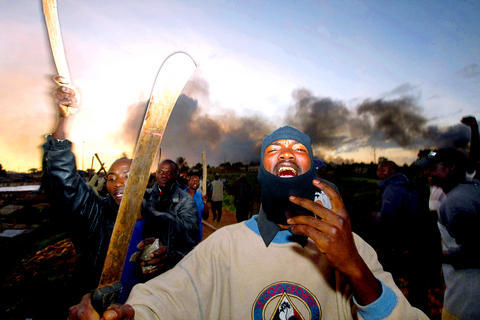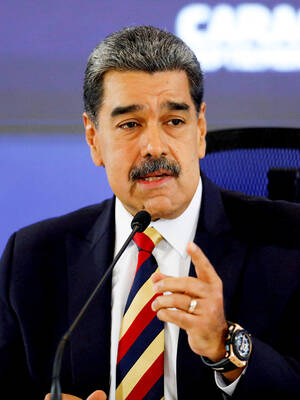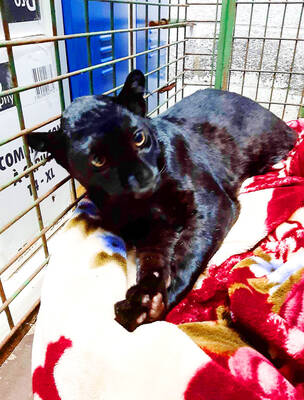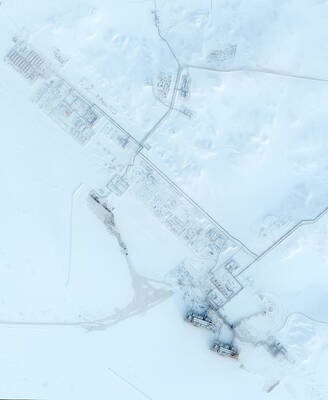Police fired shots in the air and sent tear gas into Nairobi's slums yesterday as President Mwai Kibaki began a second term after an election marred by violence and allegations that he stole the vote.
Kibaki, 76, was sworn in almost immediately after the results were announced on Sunday. Within minutes, the slums -- home to tens of thousands of opposition supporters -- exploded into fresh violence.
"We have been rigged out, we are not going to accept defeat," 24-year-old James Onyango, who lives in the Kibera shantytown, said yesterday. "We are ready to die and we're ready for serious killings."

PHOTO: AFP
Kenyan authorities imposed a curfew yesterday in the violence-wracked city of Kisumu, with police ordered to shoot any violators, a senior police official said.
"A day-time curfew [6am to 6pm] has been imposed in Kisumu. Police have been ordered to shoot violators," the official said on condition of anonymity.
At least 53 people were killed in Kisumu in overnight violence related to President Mwai Kibaki's re-election.
Police fired tear gas into homes; in one case, a woman and her four young children ran out, retching.
"We were just hiding from the shots," said Dorothy Nyangasi, whose six-month-old baby was strapped to her back.
Raila Odinga, the firebrand opposition candidate who had been leading early results and public opinion polls, rejected the results and was planning a ceremony to be declared "the people's president" later yesterday in Nairobi's Uhuru Park -- where protesters seeking multiparty democracy used to gather in the early 1990s.
Police banned the event, and hundreds of riot police were deployed around the park.
The bloodshed was a stunning turn of events in one of the most developed countries in Africa, with a booming tourism industry and one of the continent's highest growth rates. Many observers saw the campaign as the greatest test yet of this young, multiparty democracy and expressed great disappointment as the process descended into chaos.
Odinga said the dispute could trigger a political crisis. He also compared the country to Ivory Coast -- the once stable West African nation where a 2002 coup sparked a civil war.
Elections chief Samuel Kivuitu read the results on live television after other media were expelled from the main vote headquarters on Sunday. He said Kibaki beat Odinga by 231,728 votes in the closest race in Kenya's history.
"This means Honorable Mwai Kibaki is the winner," Kivuitu said, soon after he was escorted from the counting center under armed guard. Hecklers had stopped his announcement with shouts of "This is not a police state!" and "Justice!"
But even Kivuitu acknowledged problems with the count, including a constituency where voter turnout added up to 115 percent and another where a candidate ran away with ballot papers.
Alexander Graf Lambsdorff, the chief EU election monitor, said the Electoral Commission of Kenya "has not succeeded in establishing the credibility of the tallying process to the satisfaction of all parties and candidates."
Kibaki was sworn in almost immediately after the results were announced, standing with his hand on the Bible in a serene ceremony at State House as his wife Lucy and dignitaries looked on.
"We have done our nation proud and set a good example for the rest of the continent," Kibaki said. "With the general election now behind us, it is time for healing and reconciliation among all Kenyans."
Lambsdorff said his mission would produce a detailed statement, including recommendations for the government, in February.
He said Kenya's 2002 election -- when Kibaki's victory ended the 24-year rule of former President Daniel arap Moi -- had been a real example for the region.
"Our yardstick for the 2007 elections were the 2002 polls. We wanted to maintain the standards for the sake of Kenyan democracy," he said. "In the parliamentary round we can say yes they were successful. In the presidential we have encountered substantial problems ... I believe it is not fair to say the standards have been improved upon."
But even some people who voted for Kibaki had suspicions.
"I'm happy that Kibaki has won the election. I voted for him and wanted him to win," said Macharia Mwingi, 42, a taxi driver in the capital. "But I'm not ruling out election rigging."
On Sunday, Odinga had called on Kibaki to concede and demanded a recount, saying the electoral commission "cannot possibly address the multiple levels of fraud administered by this administration."
Odinga, a flamboyant 62-year-old with a son named Fidel Castro, cast himself as a champion of the poor. His main constituency is Kibera, where some 700,000 people live in breathtaking poverty, but he has been accused of failing to do enough to help them in 15 years as a member of parliament.
In recent months, Odinga has made it a priority to reach out to the country's middle class and businessmen, many of whom belong to Kibaki's tribe, the Kikuyu. Odinga belongs to the Luo tribe.
But any attempt at reconciliation was absent in the slums, where tribal clashes raged into the night and youths shouted ethnic slurs. Mercy Akinyi, 20, blamed the election for inciting tribal violence.
"We have coexisted in this slum in peace," the 20-year-old said. "Now that the politicians are fighting, does that mean killing each other?"

VENEZUELAN ACTION: Marco Rubio said that previous US interdiction efforts have not stemmed the flow of illicit drugs into the US and that ‘blowing them up’ would US President Donald Trump on Wednesday justified a lethal military strike that his administration said was carried out a day earlier against a Venezuelan gang as a necessary effort by the US to send a message to Latin American cartels. Asked why the military did not instead interdict the vessel and capture those on board, Trump said that the operation would cause drug smugglers to think twice about trying to move drugs into the US. “There was massive amounts of drugs coming into our country to kill a lot of people and everybody fully understands that,” Trump said while hosting Polish President

Japan yesterday heralded the coming-of-age of Japanese Prince Hisahito with an elaborate ceremony at the Imperial Palace, where a succession crisis is brewing. The nephew of Japanese Emperor Naruhito, Hisahito received a black silk-and-lacquer crown at the ceremony, which marks the beginning of his royal adult life. “Thank you very much for bestowing the crown today at the coming-of-age ceremony,” Hisahito said. “I will fulfill my duties, being aware of my responsibilities as an adult member of the imperial family.” Although the emperor has a daughter — Princess Aiko — the 23-year-old has been sidelined by the royal family’s male-only

A French couple kept Louise, a playful black panther, in an apartment in northern France, triggering panic when she was spotted roaming nearby rooftops. The pair were were handed suspended jail sentences on Thursday for illegally keeping a wild animal, despite protesting that they saw Louise as their baby. The ruling follows a September 2019 incident when the months-old feline was seen roaming a rooftop in Armentieres after slipping out of the couple’s window. Authorities captured the panther by sedating her with anesthetic darts after she entered a home. No injuries were reported during the animal’s time on the loose. The court in the

Another tanker carrying liquefied natural gas from Russia’s sanctioned Arctic LNG (liquefied natural gas) 2 project has docked in a Chinese port, ship-tracking data showed, days after Russian President Vladimir Putin met Chinese President Xi Jinping (習近平) in Beijing. The London Stock Exchange Group (LSEG) tracking data indicated the Russian Voskhod LNG tanker was anchored at an LNG terminal in the port of Tieshan in Guangxi, China. The Russian flagged tanker, with a cargo of 150,000 cubic meters of LNG, was loaded up at the Arctic LNG 2 facility in Gydan in northern Siberia on July 19, LSEG data showed.